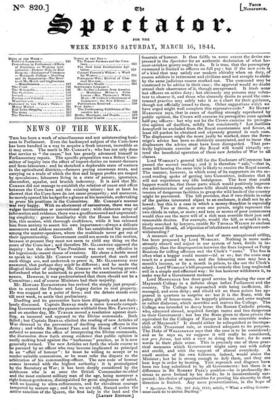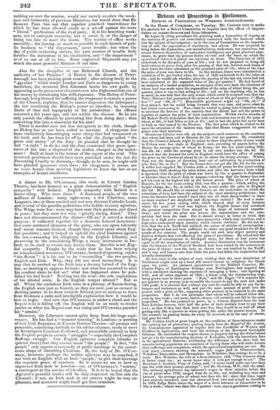NEWS OF THE WEEK.
'Tars has been a week of miscellaneous and not uninteresting busi- ness in Parliament. Even the hackueyed subject of the Corn-laws has been handled in a way to acquire a fresh interest, incredible as it may seem. The merit is Mr. COBDEN'S ; who has not only done that service to " the cause," but has greatly advanced himself in Parliamentary repute. The specific proposition was a Select Com- mittee of inquiry into the effect of import-duties on tenant-farmers and farm-labourers : and he sketched a deplorable state of matters in the agricultural districts,-farmers paying enormous rents, and carrying on a trade of which the first and largest profits are reaped by speculators; labourers living in a state of penury, ignorance, discomfort, squalor, and brutish indecency. It is said that Mr. Conner'. did not manage to establish the relation of cause and effect between the Corn-laws and the existing misery : but at least he showed that the Corn-laws do not cause prosperity ; and moreover, he merely opened his budget for a glance at his materials, undertaking to prove his positions in the Committee. Mr. COBDEN'S manner was very happy. With no abatement of earnestness, there was no vulgar incrimination or conventional cant ; with elaborate array of information and evidence, there was a goodhumoured and unpretend- ing simplicity : greater familiarity with the House has endowed him, this session, with thorough confidence, while it has released him from anxiety to assert his own importance-always a delicate manoeuvre and seldom successful. He has established his position among the master-speakers, where the multitude never get out of their apprenticeship. Government could not accede to the motion, because at present they must not seem to yield any thing on the score of the Corn-law ; and therefore Mr. GLADSTONE opposed the inquiry : but the clever Vice-President was not very effective in his ingeniousLy-meant tissue of evasions. He chose a feeble mood to speak in: while Mr. COBDEN roundly asserted that such and such things are, and undertook to prove it, Mr. GLADSTONE ever answered, that perhaps they might be different ; and he made the illogical blunder of charging Mr. COBDEN with not having proved beforehand what he undertook to prove by the examination of wit- nesses. However, it was predetermined that there should not be a Committee ; and of course Ministers had their majority. Mr. HOWARD ELPHINSTONE has revived the simply just proposi- tion to extend the Probate and Legacy duties to real property. He was stopped on a point of form ; and the debate stands over till next week, to settle that preliminary. Duelling and its prevention have been diligently and not fruit- lessly discussed. Captain BERNAL made a move towards compel- ling Government to grant the pension withheld from Mrs. FAWCETT ; and on another day, Mr. TURNER moved a resolution against duel- ling, as immoral and opposed to the Divine commands. Both failed ; but Captain BERNAL elicited the reading of new Articles of War directed to the prevention of duelling among officers in the Army ; and while Sir ROBERT PEEL and the House of Commons refused to assume the office of interpreting the Divine commands, the discussion drew forth strong evidence that public opinion is really making head against the " barbarous " practice, as it is now generally termed. The new Articles set forth the whole course to be pursued by an officer who may become implicated as principal in an " affair of honour" : he must be willing to accept or to render suitable concessions, or he must refer the dispute to the arbitration of his commanding-officer. The new code of honour comes invested with the highest authority : it is promulgated by the Secretary at War ; it has been deeply considered by the nobleman who is at once the British Commander-in-chief and the most eminent military man of the age, being moreover a right honest gentleman, distinguished for great singleness of mind, with no leaning to ultra-refinements, and for chivalrous courage tempered by mature age ; and it is, we are told, framed under the active sanction of the Queen, the first lady in the land and the fountain of honour. It thus fulfils to some extent the desire ex- pressed in the Spectator for an authentic declaration of what ho- nour-stricken gentry ought to do. It is true, that the peremptory command is limited to officers on full pay ; but if the new code is of a kind that may satisfy our modern chivalry when on duty, of course soldiers in retirement and civilians need not scruple to abide by the same judicious course marked out. The command may be construed to be advice in their case ; the approval would no doubt attend their observance of it, though unexpressed. It binds none but officers on active duty ; but obviously any persons may volun- teer to observe it, and those who sincerely desire to avoid the con- temned practice may. safely' take it as a chart for their guidance, though not officially issued to them. Other suggestions which we have urged might well complete this repressive code.* Sir IlEssit HARDINGE says, that in cases of duelling strongly reprobated by public opinion, the Crown will exercise its prerogative even against half-pay officers : but why not let the Crown exercise its preroga- tive against all duellists, mildly but consistently ? Let duellists henceforth be excluded from the Royal countenance and favour, at least till pardon be obtained and expressly granted in each case. The displeasure might the more justly be marked, since the Sove- reign's advice has been so distinctly enunciated, and to incur the displeasure the advice must have been disregarded. That per- fectly legitimate exercise of the Royal will would virtually ex- tend the beneficial operation of these new Articles of War to all classes.
Lord WoasLty's general bill for the Enclosure of'Commons has passed the second reading ; and it is therefore II safe,"-that is, some bill bearing the same title is likely to receive the Royal assent. The manner, however, in which some of its supporters on the se- cond reading spoke of getting into Committee, indicates that it will not experience any idle indulgence. The best that could happen would be, that those parts which would positively improve the administration of enclosure-bills should remain, while the ex- tension of dangerous facilities to grasp the wild lands of the country might be prevented. The bill provides, that if two-thirds in value of the parties interested object to an enclosure, it shall not be al- lowed: but this is a case in which a money-franchise is especially unjust. Two or three, or even one person, might represent the two-thirds in value, or more ; and tens or scores of poor commoners would thus see the mere will of a rich man override their just and reasonable desires. For example, would the bill, or would it not, nicely searched by lawyers, enable Sir THOMAS WILSON to enclose Hampstead Heath, all objection of inhabitants and neighbours not• withstanding?
A measure of less pretension, but of more unequivocal utility, has been proposed by Lord WORSLEY. Nothing is more mon- strously absurd and unjust in our system of laws, fertile in in- equality, than the disproportion between the fines imposed at Petty Sessions for trifling offences and the Clerk's " costs. The fine is often what a beggar could muster-2d. or so ; but the costs may reach to a pound or more, and the labouring man may lose a month's income, or lie a month in prison, to eke out the Clerk's salary. Lord Woascsfs bill proposed to remedy that long-neglected evil in a simple and effectual way : he has however withdrawn it, to make way for a Government measure.
Lord MONTEAGLE has done good service by placing the case of Maynooth College in a definite shape before Parliament and the country. The College is reproached with being inefficient, ill- managed, and even dirty; and ribald wit on those points has ap- peared in quarters to surprise us : but it is the State, with its paltry gift of house-room, its beggarly pittance, and utter neglect or rather disfavour, which mortifies and starves the College. The College was intended to decoy home the Roman Catholic priests, who, educated abroad, acquired foreign tastes and ties dangerous to their Government : but has the State given to those priests the equivalent for the Colleges of Europe in the one miserable make- shift of Maynooth ? It should either be relinquished as incompa- tible with Protestant rule, or rendered adequate to its purpose. The Duke of WELLINGTON says that the case is to be considered: and as he says so, we suppose it will really be considered, not pro forma, but with a view to doing the best ; for he uses words in their plain sense. This is precisely one of those prac- tical measures which Government might carry out with safety and credit, and with the support of almost everybody. A small section of his own followers, indeed, would abuse the Minister ; but he is strong enough to defy them, and they are best kept in order by beating. This reproach and disgrace have been too long submitted to by all Governments : but there is a difference in Sir ROBERT PEEL'S position-be is professedly de- sirous to serve Ireland by his deeds; he is inconveniently sus- pected; his choice of opportunities for proving his sincerity in that direction is limited. Any mere procrastination, in the hope of * Spectator, No. 786, 221 July 1843; article, " What a willing Govern- ment could do to abolish Duelling." rubbing on over the session, would not merely emulate the weak- ness and insincerity of previous Ministers, but would show that Sir ROBERT PEEL has not that superior practical benevolence for which he has been allowed credit as a set-off against the more " liberal " professions of the rival party. It is his besetting weak- ness, not to anticipate necessity, but to await it, at the danger of being too late to meet the storm. The routine of office works smoothly ; the leaving as much as possible in each branch of pub- lic business to " the department," saves trouble : but when the day of public reckoning arrives, the past evasion of trouble little fortifies the statesman in his vindication, and " the department " is of no use at all to him. Some neglected Maynooth may yet wreck the most powerful Minister of our time.



























